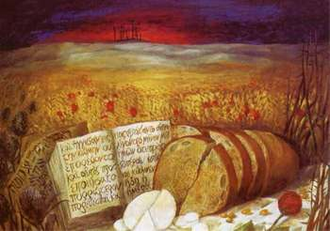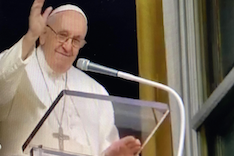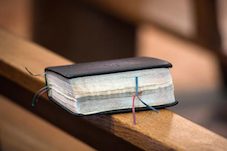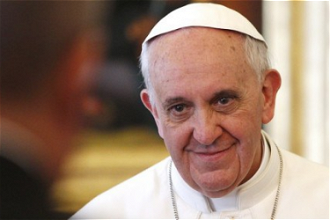Text: Canon Pat Browne on The Word of God

Sieger Köder - Image St Bernard's Abbey
When I was in Primary School - a long time ago - I remember the question being asked in catechism class; "When are you late for Mass?" You wouldn't believe it but the answer then was, so long as you are in for just after the gospel you're not late! The implication being that what had happened up to then was not that important.
Nothing could be further from the truth. This was based on an old Catholic thing. The Bible was for Protestants. We Catholics had the sacraments, and in this case the Mass was all about the sacrifice and Holy Communion.
Thank God we have moved away from all that. It didn't make sense. How could we know what the sacraments are for if we had not read our Bible.
No, the early Christians got it right. If you asked them where they were going to on Sunday, they would tell you; "I'm going for the Teaching and the Breaking of Bread. In other words, for the Readings from the Scriptures, God's Word - the Teaching - and THEN the sacrament of the Eucharist which they called the breaking of Bread.
Pope Francis is really keen that we Catholics get to know our Holy Book, Our Scriptures, our Bible, better than we do and so he has designated this The Sunday of God's Word.
To help that along I have this idea.
Some people boast that they have read the Bible from start to finish. Can I respectfully suggest that this is not the best way of doing it. The Bible is not a book. It is a Library of Books between two covers - French word Bibliotheque…To say I have read the Bible from start to finish is like saying I went into the library and started one end and read everything till I got to the other end. You'd be punch drunk by the end of that!
I think we should start in a simpler way. To those of you who read the Bible every day. That's great. Don't interrupt what is a great habit you have got into. For those of you who don't do so on a regular basis I am giving out a copy of St Matthew's Gospel - one to every household - at all Masses today and suggesting that each person read just one chapter a day. There are 28 Chapters in Matthew and if we all did this we would have read the whole Gospel in the month of February. Just imagine that! At least one person in every Catholic flat, bedsit or house in Pimlico would have read the whole Gospel in that month. It's a powerful thought. Are you up for it? I hope so.
But don't read it to get through it. Read it slowly and prayerfully. And if something hits a chord with you, then stop reading, think about it and pray about what you have just read.
I would love people to say to me: "I read a bit every day but I'm not getting through a chapter. I'm taking it in small chunks and praying about it."
Doing it that way is much better. And it could be Easter before you have read the whole lot. But so what! Better to have read three pages prayerfully than the whole lot in a rush.
Inside the cover of each Gospel there is a lovely prayer I found recently - prayer for the unsure.
Dear God, sometimes I don't even know that you are there.
But I want to know the truth about you, about life, about eternity.
So please help me to discover the truth as I read this Gospel and look into the life of Jesus Christ.
Help me to be honest about what I find in him, and what his teaching says about me.
And help me to have the courage to respond to whatever I discover, with honesty. Amen
Say that prayer each day before you start reading and then go slow!
When you start with the first chapter verses 1 to 17 you may end up saying to yourself: "What was all that about!" It is a genealogy. Matthew is making a point. He is writing for Jews. So he starts off by showing them through this genealogy who Jesus is. He is the one they have been waiting for. To us this may seem an uninteresting passage but to the Jew of that time. It would be a most impressive matter that Jesus could be traced back to David, and even to Abraham. Within that line Matthew is proving that Jesus was the son of David. They were expecting a Messiah to come from this line. And that is Matthew's point.
So, no need to spend too much time on those particular verses but keep that point in mind as you read through the rest of the Gospel. That is what Matthew wants you to do. This is who Jesus is. He is the One you have been expecting.
So, go for it. And don't be shy about discussing it with other parishioners. "How far have you got to? Where are you up to? What part are you reading now? How are you getting on with it?" To have people chatting about the Word of God. Can't be bad!
Canon Pat Browne is Parish Priest at Holy Apostles church, Pimlico, central London and Roman Catholic Duty Priest in the Houses of Parliament.
LINKS
Pope institutes day dedicated to celebrating the Word of God - www.indcatholicnews.com/news/37997
Text: Apostolic Letter 'Motu Proprio'- Aperuit illis - www.indcatholicnews.com/news/37996
'The God Who Speaks'. www.cbcew.org.uk/home/events/the-god-who-speaks/
Content and resources to help you celebrate the Bishops' Conference 2020 Scripture Initiative
.


















